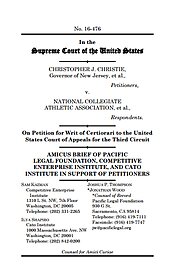Learn more about Cato’s Amicus Briefs Program.
Why do we even have states? While a fairly common question now in light of the federal Leviathan, it likely would have seemed quite foreign to the Constitution’s authors. The Framers saw federalism’s decentralization of government authority as a central bulwark of ordered liberty, preventing any one entity or bloc from gaining too much power over the nation while encouraging innovative competition among the several “laboratories of democracy.” Unfortunately, federalism’s safeguards against centralized authority have slowly eroded, particularly since the New Deal Supreme Court’s expansive reinterpretation of the Commerce Clause paved the way for aggressive federal expansion under Presidents Roosevelt, Johnson, and beyond. One firewall that has survived, however, is the anti-commandeering doctrine: the idea that the federal government may not compel states or state officials to implement federal policies. In other words, states cannot be made into mere “puppets of a ventriloquist Congress.” Printz v. United States (1997).
It is this anti-commandeering doctrine that is under threat in this case. The Professional and Amateur Sports Protection Act (PASPA) is a federal statute that does not allow states to “authorize” sports gambling “by law.” So when New Jersey wanted to repeal some of its old gambling laws, it was stopped from doing so by PASPA, prompting Governor Chris Christie to sue on the grounds that the law infringes on New Jersey’s sovereignty and further undermines the United States’ federalist structure. The U.S. Court of Appeals for the Third Circuit interpreted this prohibition to bar states not just from affirmatively licensing sports gambling, but also from repealing or modifying preexisting state prohibitions. It held that PASPA did not violate the anti-commandeering doctrine because New Jersey wasn’t being compelled to pass new legislation, just forbidden from repealing existing laws. In doing so, it accepted an argument based almost entirely on semantics. Regardless of whether the federal government compels or forbids particular action, the result — a state’s being forced to regulate behavior that its duly elected representatives prefer to leave unregulated — is the same. If allowed to stand, this absurd loophole may have wide-ranging implications across many policy areas and poses a serious threat to what remains of state sovereignty.
Cato has joined the Pacific Legal Foundation and the Competitive Enterprise Institute on a brief supporting New Jersey’s petition for Supreme Court review. We urge the court to take up the case so that it can clarify the proper scope of the anti-commandeering doctrine and ensure that the sovereignty of the individual states — so critical to the republic’s constitutional system of checks and balances — is not further eroded by an overreaching national government.
